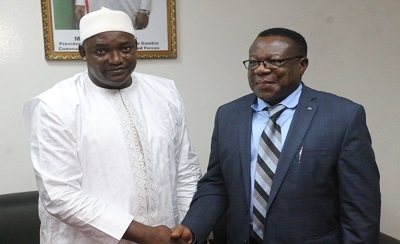
Banjul, 20 June 2017 (ACBF) – President Adama Barrow of the Gambia says solutions to the difficulties faced by African nations lie within the continent itself and that institutions such as the African Capacity Building Foundation (ACBF) can help make all the difference. An elated President Barrow made the remarks as he played host to a delegation from the ACBF, led by Executive Secretary Prof. Emmanuel Nnadozie, visiting the country to work out key areas of partnership in view of providing the knowledge and policy support needed to actualize the country’s current development plan.
“The recent problems of The Gambia are African problems, which require African solutions,” said the Gambian leader, who specifically mentioned the need for civil service reforms and capacity building in his country.
“I will count on African institutions such as the African Capacity Building Foundation to help move my government’s agenda forward,” President Barrow observed.
“Africa’s transformation agenda is the very leitmotiv of the African Capacity Building Foundation and there is no better place to act upon this goal than in the Gambia which is undergoing a historic wind of change both as a budding democracy and as a nation with a leadership bent on bringing development to its people,” said the visiting Prof Nnadozie, who had earlier congratulated President Barrow and his Government on their accession to power as well as on their demonstrated resolve to transform the country.
“We concur with the Government of The Gambia that a revolution in governance especially through robust reforms of the civil service and institutions as well as through the retooling and retention of human resources are the very places to start on the road to the desired transformation.
“The Gambia has a strong and highly competent diaspora community and we are committed to hitch horses with Gambian authorities to work out a strategy to attract and retain this critical mass of experts for the country’s development, moving forward,” Prof. Nnadozie added.
According to President Barrow, the visit of ACBF’s Executive Secretary has come at the right time when his government is fashioning out a national development plan, which will set a vision for the country in the coming years.
Details of how the ACBF would contribute to this plan were discussed with both the President and members of his Government, including Vice President Fatoumata Tambajang and Finance Minister and ACBF Board of Governors member – Hon. Amadou Sanneh.
The ACBF delegation also held talks with the President of the Gambia Chamber of Commerce and Industry (GCCI) – Mr. Muhamed Jagana, and the Governor of the country’s Central Bank – Mr. Bakary Jammeh. While the working session with Mr. Jagana served to figure out the crucial role that the private sector should play in supporting Gambia’s development, the discussion with Governor Jammeh centered on further developing the capacity of staff of the Bank, as ACBF has done in the past to enhance their contribution to development.
The African Capacity Building Foundation, it should be noted, is currently funding a study that will address the human and institutional capcity needs required to implement the Gambia’s revised national development plan, established by the country’s new Government.
A total of 60 public and private sector officials are expected to benefit from ACBF-funded capacity building programs in 2017.
-ENDS HERE-
For more information, please contact:
Abel Akara Ticha – Senior Communication Officer
The African Capacity Building Foundation
Harare, Zimbabwe
+263 7+263-4 304663, 304622, 332002, 332014; Ext. 279
Email: [email protected]
About the African Capacity Building Foundation
Established in 1991, ACBF builds human and institutional capacity for good governance and economic development in Africa. To date the Foundation has empowered people in governments, parliaments, civil society, private sector and higher education institutions in more than 45 countries and 6 regional economic communities. ACBF supports capacity development across Africa through mobilization and leveraging of resources for capacity development; grants, investments and fund management; knowledge services; promoting innovation in capacity development and capacity development advisory services. The establishment of ACBF was in response to the severity of Africa’s capacity needs, and the challenges of investing in indigenous human capital and institutions in Africa. ACBF interventions are premised on four principles: the centrality of capacity to the development process in Africa; the critical role of a partnership and demand-driven approach in tackling capacity challenges; African ownership and leadership in the capacity development process; and a systematic, sequenced and coordinated approach to the capacity development process that pays attention to capacity retention and utilization. For further information go to: www.acbf-pact.org





